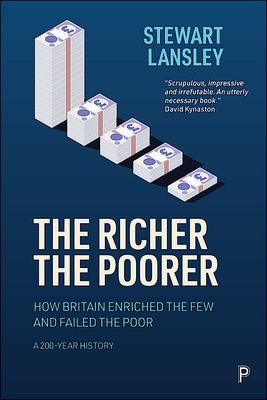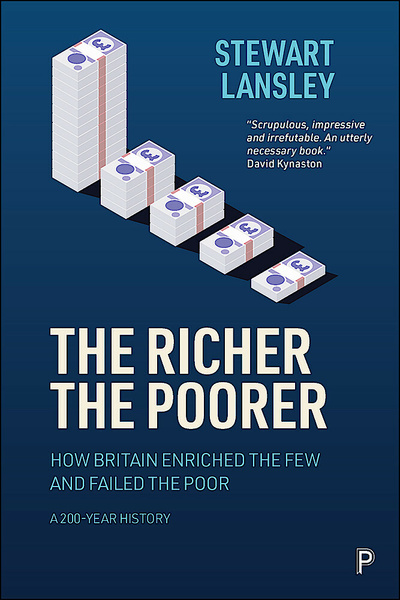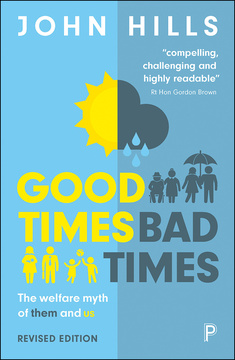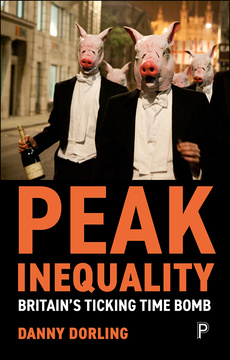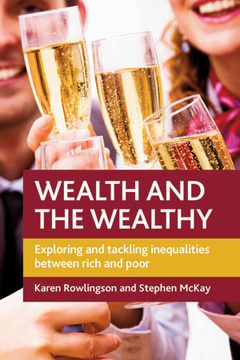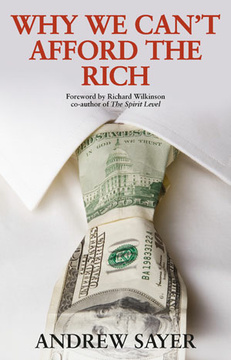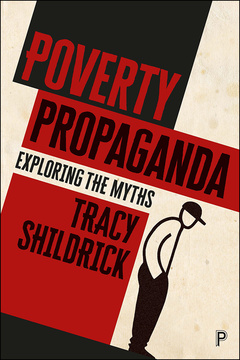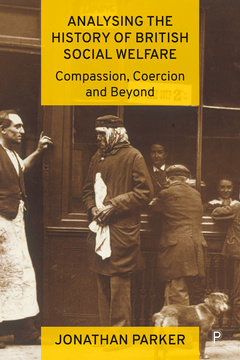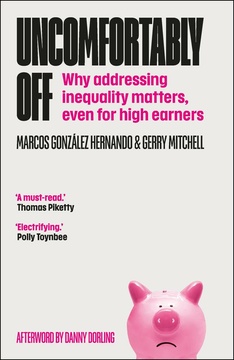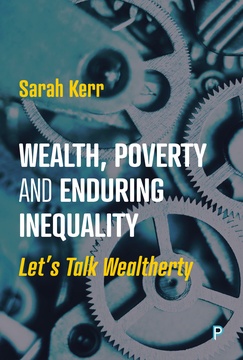The Richer, The Poorer
How Britain Enriched the Few and Failed the Poor. A 200-Year History
By Stewart Lansley
Published
Nov 25, 2021Page count
318 pagesISBN
978-1447363217Dimensions
216 x 138 mmImprint
Policy PressPublished
Nov 25, 2021Page count
318 pagesISBN
978-1447363200Dimensions
234 x 156 mmImprint
Policy PressPublished
Nov 25, 2021Page count
318 pagesISBN
978-1447363224Dimensions
216 x 138 mmImprint
Policy PressPublished
Nov 25, 2021Page count
318 pagesISBN
978-1447363224Dimensions
216 x 138 mmImprint
Policy Press
In the media
'Britain will fail to reduce poverty until it tackles inequality' on Transforming Society
'The Richer, The Poorer' book review on Cost of Living
'Why luxury capitalism is the enemy of social progress' in Discover Society
'Could post-war drive for a more equal society help with today’s cost of living crisis?' in the Conversation
Poverty in Britain is firmly linked to the country’s mountain of private wealth – Labour must address this growing inequality in the Conversation
On the blog:
Book review: Stewart Lansley’s ‘The Richer, The Poorer’
Intensifying sanctions on claimants is a mistake: Stewart Lansley
Can poverty be abolished?
PODCAST: How linking poverty and wealth will break the inequality cycle
Turning asset-rich Britain into a wealth sharing democracy
Can Keir Starmer meet his promise on poverty?
The Richer, The Poorer charts the rollercoaster history of both rich and poor and the mechanisms that link wealth and impoverishment. This landmark book shows how, for 200 years, Britain’s most powerful elites have enriched themselves at the expense of surging inequality, mass poverty and weakened social resilience.
Stewart Lansley reveals how Britain’s model of ‘extractive capitalism’ – with a small elite securing an excessive slice of the economic cake – has created a two-century-long ‘high-inequality, high-poverty’ cycle, one broken for only a brief period after the Second World War. Why, he asks, are rich and poor citizens judged by very different standards? Why has social progress been so narrowly shared? With growing calls for a fairer post-COVID-19 society, what needs to be done to break Britain’s destructive poverty/inequality cycle?
“A resource that can help us make up our own minds about extremes of wealth and poverty, privilege and want, instead of being encouraged to ‘other’ welfare claimants and kid ourselves we share the interests of the profiteering one per cent. We should arm ourselves with it in all our anti-poverty struggles.” Cost of Living
“The key takeaway of this excellent history is that poverty cannot be fought effectively, unless we also tackle the social and economic inequality that creates it.” Labour Hub
"Lansley is a master of the telling anecdote and has produced a wonderfully readable and insightful history of how the rich have impoverished the poor." Jonathan Bradshaw, University of York
“A readable and illuminating context to our present day extreme inequalities, exposing the narratives that justify these persistent conditions and the folly of ignoring them.” Chuck Collins, Institute for Policy Studies
“An important and illuminating book, an essential antidote to the outdated and iniquitous idea that some people are worth more than others.” Kate Pickett, University of York
“Scrupulous, impressive and irrefutable. No one can read this damning historical portrait without wondering why we allow such grotesque gaps – seldom related to merit or social worth – to continue. An utterly necessary book.” David Kynaston, author of Austerity Britain
"A remarkably informed and readable history with a powerful message: skyrocketing inequality is not just an economic drain; it is a moral stain.” Jacob S. Hacker, Yale University
"Crucially, the book extends our understanding of inequality by showing the clear, dependent relationship, between poverty and wealth extraction. The book forces readers to confront, not just the reliance of the rich on the poor to make money, but also the long-standing and stubborn nature of this relationship in Britain.” Tracy Shildrick, Newcastle University
"A rich, deeply researched chronicle of poverty and inequality in the UK over the last 200 years…very readable, very interesting and packed with exhaustive and almost exhausting detail." Geoff Crocker, author of Basic Income and Sovereign Money
“Crucially, the book extends our understanding of inequality by showing the clear, dependent relationship, between poverty and wealth creation. The book forces readers to confront, not just the reliance of the rich on the poor to make money, but also the long-standing and stubborn nature of this relationship in Britain”. Brave New Europe
”A vivid description of the fall and rise of poverty and inequality... impressive survey and analysis of 200 years of inequality." Journal of Social Policy
“Important....passionate and thoroughly researched.” Political Quarterly
"Written with academic precision and a journalist’s panache... a valuable statement of a distinctively social democratic view of modern British history, with recommendations that deserve serious attention." Peter Sloman, University of Cambridge
Stewart Lansley is a visiting fellow in the School of Policy Studies, the University of Bristol, a Council member of the Progressive Economy Forum and a Research Associate at the Compass think-tank. He is a fellow of the Academy of Social Sciences and has written widely on poverty, wealth and inequality. His recent books include A Sharing Economy (2016), Breadline Britain, The Rise of Mass Poverty (with Joanna Mack, 2015) and The Cost of Inequality (2011).
Introduction: Knighthoods for the rich, penalties for the poor
Part 1: 1800-1939
1. Hierarchical discipline
2. Britain’s gilded age
3. Public penury and private ostentation
4. A roller-coaster ride
Part 2: 1940-59
5. The future belongs to us
6. Britain’s ‘New Deal'
7. Brave new world
8. A shallow consensus
Part 3: 1960-79
9. The rediscovery of poverty
10. Poorer under Labour
11. Consolidation or advance?
12. Peak equality
Part 4: 1980-96
13. Don’t mention the 'p' word
14. Zapping Labour
15. The dark shadow of the Poor Law
16. The great widening
17. Money worship
Part 5: 1997-2010
18. The elephant in the room
19. Still born to rule
20. I'm not Mother Teresa
21. The house of cards
22. The good, the bad and the ugly
Part 6: 2011-20
23. Divide and rule: playing politics with poverty
24. A leaner state
25. Burning injustice
26. Growing rich in their sleep
27. The high-inequality, high-poverty cycle
Afterword: COVID-19 and 'the polo season'







